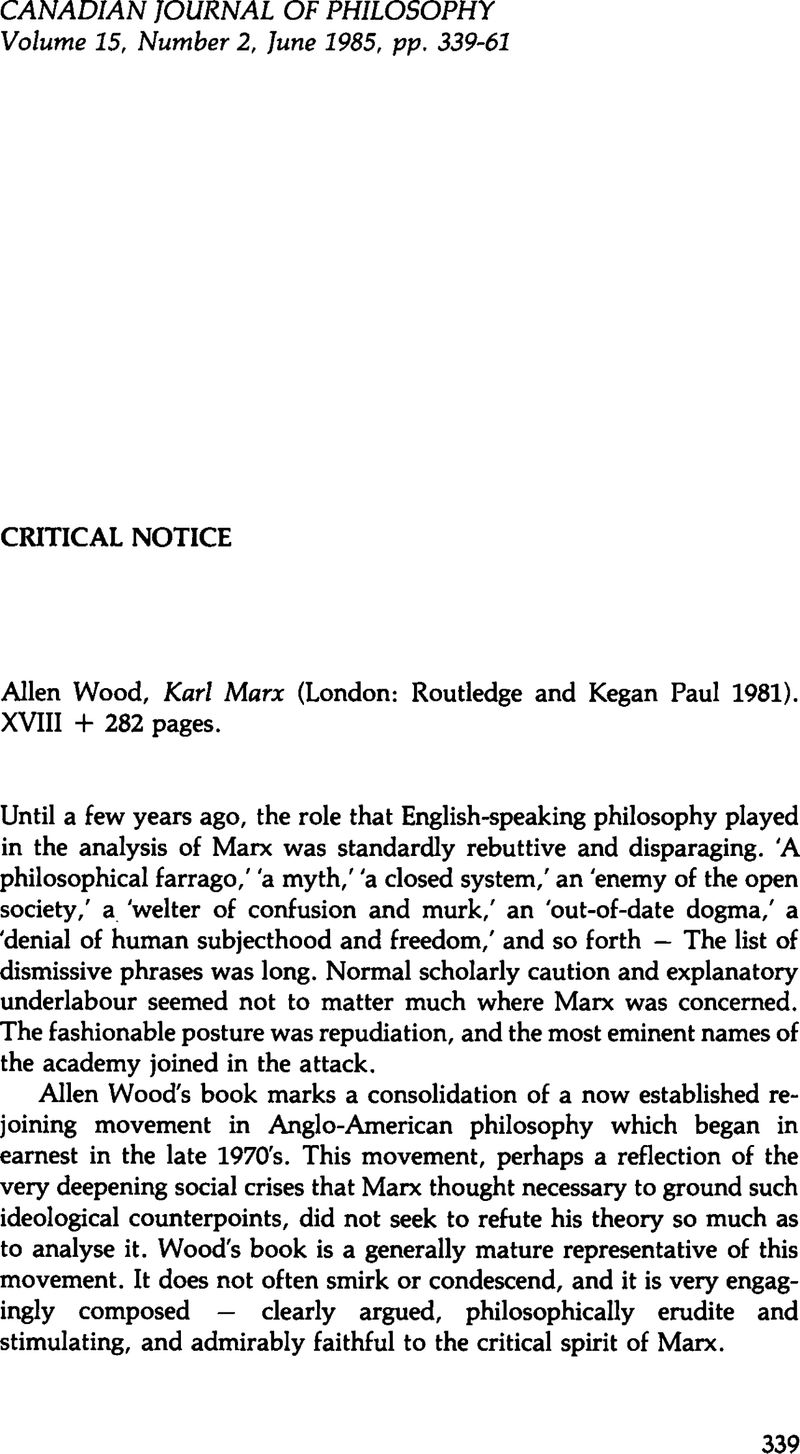No CrossRef data available.
Article contents
Allen Wood Karl Marx (London: Routledge and Kegan Paul 1981). XVIII + 282 pages.
Published online by Cambridge University Press: 01 January 2020
Abstract

- Type
- Critical Notice
- Information
- Copyright
- Copyright © The Authors 1985
References
1 See Cohen, G.A. Karl Marx's Theory of History: A Defence (Princeton: Princeton University Press 1978), 160–80,Google Scholar 194-201, 279-96.
2 The all-subsuming nature of the teleological/functionalist account of historical materialism offered by Wood and Cohen seems implied by such remarks as these:
Schelling and Hegel, however, because they view everything whatever as belonging to a single, embracing organic system, do hold that teleological explanations can be given for efficient causes and causal regularities, and they even hold that such teleological explanations have a kind of ontological priority over causal ones. As we shall see later, there is some reason to think that Marx and Engels follow Schelling and Hegel at this point. (Wood, 252 n)
Merton (“Manifest and Latent Functions,” 104) requires of items to which functions may be assigned that they be “standardized i.e., patterned and repetitive” … There is no good reason for this restriction … It is possible to offer functional explanation of a particular event, such as the passage of a bill, or for that matter, an enactment of a social role on a particular occasion …. (Cohen, 296 n)
3 Nielsen, Kai and Patton, Steven eds., Marx and Morality (Guelph, Canada: Canadian Association for Publishing in Philosophy 1980.)Google Scholar Relevant articles here are: ‘Marxism and Moral Objectivity’ by William H. Shaw (19-44). ‘Morality and the Marxist Concept of Ideology’ by R.G. Pieffer (67-93), ‘Marxism, Morality and Ideology’ by Douglas Kellner (93-120), Is There a Marxist Personal Morality', by John McMurtry (171-92), and ‘Doing Marx Justice’ by Gary Young (251-68).
4 Marx, Karl The German Ideology (Moscow: Foreign Languages Publishing House 1964), 207Google Scholar
5 See The Structure of Marx's World-View (Princeton: Princeton University Press 1978) 30-2, 52-3 and 232-8, and Nielsen and Patten, 171-92.
6 Consider such remarks as these:
The proletarians arrive at this unity only through a long process of development in which the appeal to their right plays a part … making them take shape as “they,” as a revolutionary united mass’ (Marx, Karl and Engels, Frederick Collected Works, Vol. 5 (New York: International Publishers, 323.Google Scholar)
To complete my book [Capital] … I have sacrificed health, happiness and family …. If one chose to be an ox, one could of course turn one's back on the sufferings of mankind and look after one's own skin (Letter to S. Meyer, 1867. Marx Engels Selected Correspondence (Moscow: Foreign Languages Publishing House, 224)
Fortunately, my position in the International enables me to upset these tricky curs. The thing is a question of the utmost importance. It is a question of abolishing the torture of one and a half million human beings not including the adult male working men (Letter to Engels, 1867 (Ibid.), 228.)
7 McMurtry, The Structure of Marx's World-view, 70-1, 142-3




